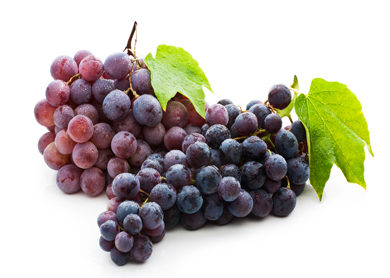
What if we told you that some of the indulgences we take part in on a daily basis—like red wine and chocolate—can be good for your health? Too good to be true, right? Not exactly.
Resveratrol, a natural chemical compound found in these and other foods, is linked to many health benefits including heart health. Studies suggest resveratrol is responsible for lowering inflammation, supporting heart health and, dare we say, contributing to anti-aging benefits.
Where Does Resveratrol Come From?
Resveratrol is found in blueberries, strawberries, cranberries and the skin and seeds of grapes, which is why there is a link to red wine. A concentrated form of resveratrol is also found in Japanese knotweed.
Many health experts feel using resveratrol in supplement form, available at your local nutrition store, is the best way to tap into the benefits of resveratrol, be it derived from grapes or knotweed.
Health Benefits
What makes this supplement so good for you? A recent study reveals one way in which resveratrol helps to protect your health, and that is by protecting your body from sphingosine kinase and phospholipase D—two molecules known to trigger inflammation. While inflammation is a natural response (a process in which your body’s white blood cells protect you from outside invaders such as bacteria and viruses), the body can get stuck in a chronically inflamed state (1). Chronic inflammation is linked to numerous health problems like heart disease. So, can resveratrol help?
Research suggests that yes, resveratrol lowers the risk of heart disease and prevents atherosclerosis, or hardening of the arteries. A study published in the New England Journal of Medicine found this powerful antioxidant supported artery health, specifically lowering LDL cholesterol, or bad cholesterol, that was building up in the arteries (2). During a one-year clinical trial, researchers found that the polyphenol resveratrol offered other cardiovascular benefits, too. They investigated the dose-dependent effects of a resveratrol-containing grape supplement on stable patients with coronary artery disease (CAD). The study showed that after one year, the patients taking the grape extract had an increase in anti-inflammatory serum in the body and a decrease in the thrombogenic plasminogen activator inhibitor, which is a protein involved in blood clots. The results from the trial suggested that consumption of a resveratrol-containing grape nutraceutical could exert cardiovascular benefits in stable-CAD patients (3).
While resveratrol cannot treat cancer, it’s interesting to see what the research community is learning about resveratrol’s effect on the disease. The University of Leicester’s lab studies are encouraging. “Having shown in our lab experiments that it can reduce tumor development, we are now concentrating on identifying the mechanisms of how resveratrol works in human cells,” say researchers (4). In the lab, they found that a daily amount of resveratrol equivalent to two glasses of wine can halve the rate of bowel tumors.
Let’s talk about the possible anti-aging effects. Humans have a gene called SIRT1 that is also known as the longevity gene. Researchers are finding that resveratrol activates this gene, thereby extending cellular life, repairing DNA and increasing antioxidant production. When SIRT1 is activated, it targets and counteracts harmful free radicals that are often connected with the deteriorating effects of aging (5).
Cellular rejuvenation slows down as we age. When taking a resveratrol supplement, it also activates the Sirtuin/SIRT2 genes, which will stimulate metabolism and muscle strength. It has been linked to increased blood flow and levels throughout the body (5). Resveratrol is not the fountain of youth, but it can help with living a healthier, longer life.
The French Paradox
Oh, to be French. Drink red wine every night, enjoy creamy foods and cheeses without care and, somehow, remain some of the healthiest people in the world. This is called The French Paradox: having some of the lowest coronary heart disease rates in the world despite enjoying a diet rich in saturated fats. This led to the idea that regular consumption of red wine may provide protection against cardiovascular disease. While there are many benefits from the resveratrol in red wine, it is not yet known whether increased consumption of polyphenols from red wine can provide a decreased risk of cardiovascular disease. Plus, one must be mindful of the effects alcohol has on the body.
So, your safest bet for resveratrol may be in supplement form, which is commonly found in dosages of 100 mg to 500 mg.
Research about this important supplement is ongoing, so talk to a health care professional if you have any concerns regarding resveratrol. WF
References
1. “The Secrets of Resveratrol’s Health Benefits,” http://articles.mercola.com/sites/articles/archive/2009/08/18/the-secrets-of-resveratrols-health-benefits.aspx, Aug. 18, 2009, accessed Jan. 25, 2013.
2. L.K. Curtiss, “Reversing Atherosclerosis?” N. Engl. J. Med. 360, 1144–1146 (2009).
3. J. Tomé-Carneiro, et al., “Grape Resveratrol Increases Serum Adiponectin and Downregulates Inflammatory Genes in Peripheral Blood Mononuclear Cells: A Triple-Blind, Placebo-Controlled, One-Year Clinical Trial in Patients with Stable Coronary Artery Disease,” Cardiovasc. Drugs and Ther., Dec. 2012.
4. University of Leicester, “New Evidence on How Compound Found in Red Wine Can Help Prevent Cancer,” press release, Dec. 4, 2012, accessed Jan. 25, 2013, www.sciencedaily.com/releases/2012/12/121205084419.htm.
5. Reserveage Organics, “Pro-Longevity Factors,” www.reserveage.com/pro-longevity-factors-pg-56.html, accessed Jan. 25, 2013.
Published in WholeFoods Magazine, March 2013










